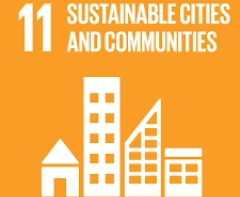.jpg)
Mobilising Urban Living Labs to create sustainable infrastructure
Cities will be home to three-quarters of humanity by 2100 but must transform rapidly to address a range of social, environmental and economic challenges.
At The University of Manchester, research on Urban Living Labs (ULL) has transformed sustainable infrastructure provision locally, and enhanced capacity in East Africa, South America and the Philippines.
This work delivers on the UN Sustainable Development Goal 11: making cities and human settlements inclusive, safe, reliant and sustainable.
Key facts
- Shaped £26m of infrastructure investment by Manchester City Council
- Replaced 20,000km of delivery van trips with e-cargo bikes
- Delivered walkability action plans and improved road safety for 5.8m citizens across East Africa, South America and the Philippines
Sustainable solutions to urban challenges
Due to the rapid expansion and urbanisation of cities across the world, there is a need for sustainable solutions to urban challenges, such as transport and city movement. These solutions are required quickly and at scale.
The Urban Living Labs approach uses partnerships to address place-based challenges by experimenting with different kinds of sustainable infrastructure.
Led by James Evans, Professor of Human Geography and Andrew Karvonen, now at KTH Stockholm, the Manchester ULL has created a foundation for understanding the importance of testing, monitoring and learning from real-world trials to adapt solutions to local requirements and maximise their benefits.
Impact at a local and global level
The ULL has delivered major sustainability impacts both locally and globally.
In Manchester, the team collaborated with Manchester City Council on the Shaping the Future City project which enhanced the sustainability impacts of the £20 million VeloCity investment and ultimately changed the city’s approach to cycling.
In Nairobi the signature project proposed by the group has been implemented, improving the safety and security of more than one million people at a key [transport] intersection. Without Evans’s research and support these changes would not have been imagined, let alone made possible.
Jim Walker / Founder of Walk21
This research showed demand from local SMEs for low-cost delivery solutions like cargo bikes and supported the need for segregated bike lanes, which has increased the number of cyclists across the city.
The value of this collaboration was clear in supporting the overall doubling of cycling on the Oxford Road Corridor.
The Manchester ULL approach was adopted as the basis for the £22 million European Union Horizon 2020 Triangulum project, showcasing solutions for Europe’s future smart cities. E-cargo bikes replaced 20,000km of van deliveries and the adoption of e-vehicles encouraged three Manchester organisations to completely electrify their fleets. All of these activities avoided 2,500 tonnes of CO2 emissions.
In the Global South, and in partnership with Walk21 (an international charity dedicated to ensuring our right to walk), the ULL approach was used to design and deliver training workshops to transport managers, police, investors, engineers and planners.
As a result, the workshops delivered walkability action plans that have improved the quality of life of a combined population of 5.8 million people in cities across East Africa, South America and the Philippines.
Podcast: Mobilising Urban Living Labs to create sustainable infrastructure

In this podcast, The University of Manchester’s Dr Nic Gowland interviews some of our leading experts about how their research is helping to deliver the UN Sustainable Development Goals for global health, equality and sustainability.
Download the Mobilising Urban Living Labs to create sustainable infrastructure podcast transcript (PDF, 31KB).
Connected activity
- How Cities Learn: From Experimentation to Transformation (research paper)
- Governing Cities for Sustainability: A Research Agenda and Invitation (research paper)
- Authored by James Evans (blogs)
Sustainable Cities online course
Find out about what our online course in 'Sustainable Cities' offers for students.
Read more
Manchester Urban Institute
Find out more about our Manchester Urban Institute.
Read more
Manchester Environmental Research Institute
Find out more about our Manchester Environmental Research Institute.
Read more
Global inequalities
Our expertise is helping to tackle inequalities that people face across the globe.
Read more


